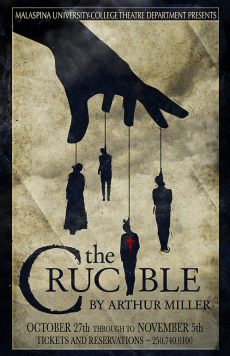
Succeeding ‘Death of a Salesman’, Arthur Miller’s ‘The Crucible’ received much criticism for being a “morality play” but also for reflecting too strongly the events of American society and political ethic of the time; McCarthyism. “The term McCarthyism, derived from the actions of Senator Joseph McCarthy in the early 1950s, has come to mean the use of reckless and unfair accusations in the name of suppressing political disloyalty.” After the Rosenburgs and Alger Hiss were exposed as Soviet spies a ‘Red Scare’ was spawned in America and McCarthy adopted this rash approach. In his play Miller reflects the theocratic society in the town of Salem during the 1692 witch hunts in which religion forms a powerful divide; either you are wholly with God or you are with the Devil. This extreme attitude, in reality paranoia, is not at all dissimilar to the McCarthyism which engulfed America in the early 1950s; this was the total devotion to Capitalism and hate of but predominantly the fear of Communism (The Red Scare).
Allegory itself represents a metaphorical representation. It is no coincidence that Miller’s portrayal of the Salem Witch Hunt of 1692 so strongly metaphorically reflects the McCarthyism that gripped America at the height of the ‘Red Scare’ in the early 1950s. The accomplished playwright himself was brought before McCarthy’s committee in 1956 and accused of deferring from the American way after he wrote ‘The Crucible’ in 1953 as a way of documenting the widespread paranoia and fear that gripped the nation at that time. At face value the characters in the play seem to satirise and mock the McCarthy era; Judge Danforth and Abigail Williams, both corrupt individuals at the heart of the persecutions, arguably reflect Joseph McCarthy whilst Reverend Paris is linkable to any of McCarthy’s close supporters and the tragic protagonist John Proctor – Arthur Miller himself. Miller portrays the ludicrous divide of right and wrong and the attitudes of the authorities (McCarthy and his committee) in the words of Judge Danforth, “You must understand, sir, that a person is either with this court or he must be counted against it, there be no road between. This is a sharp time, now, a precise time—we live no longer in the dusky afternoon when evil mixed itself with good and befuddled the world. Now, by God’s grace, the shining sun is up, and them that fear not light will surely praise it.”
Dennis Welland studied Miller and identified that the play goes beyond this face level comparison which is noted in the quotation; “Miller’s background of Depression-engendered liberalism, his passionate belief in social responsibility and his preoccupation with themes of guilt”. Welland explains Miller was a socialist and believed strongly in the people but it seems he lost faith in his own generation, evident in his other plays and allegories satirising American life such as ‘Death of a Salesman’, and ‘A View from the Bridge’. Therefore it is reasonable to suggest that Miller’s ‘The Crucible’ was perhaps written with intent to provide a warning to future generations of the dangers of the paranoid mindset of the Salem witch hunts but also the modern Red Scare and McCarthyism , “those who do not learn from history are doomed to repeat it”. The Irish poet, William Butler Yeats’, words effectively summarise the allegory which Miller defines and his warning to future generations - “The best lack all conviction, while the worst are full of passionate intensity.”

0 Comment:
Be the first one to comment on this article.